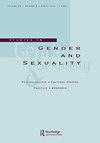A Response to a Response
Q3 Social Sciences
引用次数: 0
Abstract
ABSTRACT Using Roland Barthes’s concept of “writing degree zero,” my response focuses on the crucial capacity to distinguish, amidst the freedom of infinite movement between various psychic states, between dead and vital formations. The dead zones in Raphael’s gender performance are not related to the refusal to be “drafted” or dragged into either gender or the experience of continuous identity, but rather to a type of negation that operates within and upon him or her. This negation, whose colorful performance might be thought of as a kind of confounding photographic negative, is a radical negation of any sign of vitality whatsoever. Pointing at the pathological nature of this negation is by no means linked to its detachment from the oedipal formation. It touches on the fact that for Raphael negation has become the alternative for any type of being. This a priori negation, which was internalized throughout her/his life, works today from within.对响应的响应
利用罗兰·巴特(Roland Barthes)的“写作零度”(writing degree zero)概念,我的回应聚焦于在无限运动的自由中,区分各种精神状态、死亡形态和生命形态的关键能力。拉斐尔的性别表现中的死区与拒绝被“起草”或被拖入性别或持续身份的体验无关,而是与他或她内心和身上运作的一种否定有关。这种否定,其丰富多彩的表现可能被认为是一种令人困惑的摄影底片,是对任何活力迹象的激进否定。指出这种否定的病理本质绝不是与它脱离俄狄浦斯的形成联系在一起的。它触及的事实是,对拉斐尔来说,否定已经成为任何一种存在的选择。这种先天的否定,在她/他的一生中被内化,今天从内部起作用。
本文章由计算机程序翻译,如有差异,请以英文原文为准。
求助全文
约1分钟内获得全文
求助全文
来源期刊

Studies in Gender and Sexuality
Social Sciences-Gender Studies
CiteScore
0.80
自引率
0.00%
发文量
15
期刊介绍:
Beginning in the final two decades of the 20th century, the study of gender and sexuality has been revived from a variety of directions: the traditions of feminist scholarship, postclassical and postmodern psychoanalytic theory, developmental research, and cultural studies have all contributed to renewed fascination with those powerfully formative aspects of subjectivity that fall within the rubric of "gender" and "sexuality." Clinicians, for their part, have returned to gender and sexuality with heightened sensitivity to the role of these constructs in the treatment situation, including the richly variegated ways in which assumptions about gender and sexuality enter into our understandings of "normality" and "pathology."
 求助内容:
求助内容: 应助结果提醒方式:
应助结果提醒方式:


